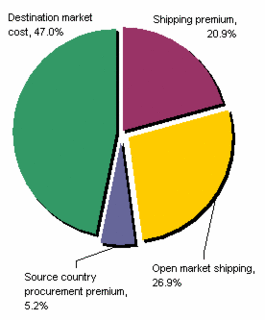Wait a minute (sound of rustling class notes while I find my place).... The political scientist's "Iron Triangle," a predecessor of the more contemporary if less eloquent "policy subsystem," usually refers to the executive agency (USDA), the Congressional committee, and the industry lobbyists. That's pretty bitter rhetoric to for Dugger to include charitable organizations in an "Iron Triangle"! Charitable organizations that work with donated funds face a painfully high standard for serving the needs of the beneficiaries alone, but that is fair enough. In the case of food aid, all participants must be acutely aware of the ways the aid can harm as well as help.It seemed like a no-brainer: changing the law to allow the federal government to buy food in Africa for Africans facing starvation instead of paying enormous sums to ship it from the American heartland, halfway around the world. Not only would the food get to the hungry in weeks instead of months, the government would save money and help African farmers at the same time. The new approach had an impeccable sponsor in Republican-dominated Washington. The Bush administration, famous for its go-it-alone style, was trying to move the United States - by far the world's biggest food donor - into the international mainstream with a proposal to take a step in just this direction. A lot of rich countries had already done so, most recently Canada.
So why is this seemingly sensible, cost-effective proposal near death in Congress?
Fundamentally, because the proposal challenges the political bargain that has formed the basis for food aid over the past half century: that American generosity must be good not just for the world's hungry but also for American agriculture. That is why current law stipulates that all food aid provided by the United States Agency for International Development be grown by American farmers and mostly shipped on United States-flag vessels. More practically, however, it is because the administration's proposal has run into opposition from three interests some critics call the Iron Triangle of food aid: agribusiness, the shipping industry and charitable organizations.
The New York Times article quotes Christopher Barrett (a prolific and thoughtful agricultural economist at Cornell). Barrett and Daniel Maxwell (from CARE, but visiting the Famine Center at the Friedman School at Tufts this Fall) released an important new book on food aid this year. In their article for Choices magazine last Fall, the two writers addressed current food aid regulations, which require the food to be purchased in the United States and shipped in U.S. ships, even if there are more efficient, affordable, or beneficial ways of supplying food assistance. A figure from that article shows how little benefit goes to the destination market under these rules.


No comments:
Post a Comment